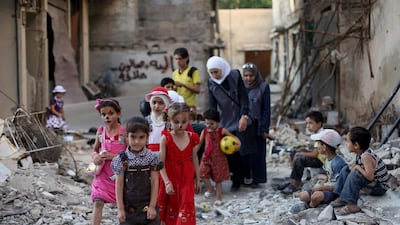The military gains in the long battle against ISIL in Mosul may be masking a troubling and potentially tragic story. As The National reported, Iraqi troops are close to fully liberating the city. But it is the long-term health and well-being of those affected by conflict, not just in Iraq, but in Yemen, Syria and Gaza, which is of increasing concern.
An Unbearable Reality: the impact of war and displacement on children's mental health in Iraq, a new report published by Save the Children, sheds light on the experiences of children in conflict. It makes for heart-breaking reading. The report unravels the unspeakable horrors of living in Mosul under the rule of ISIL and talks of the "toxic stress" that is caused by persistent exposure to violence and threat. Around 90 per cent of those children the charity spoke to expressed concern at losing a love one. Around half described in graphic details the violence their parents had had to endure. One ten-year-old said: "There was shelling all the time and ISIL was going around the city killing men and leaving them hanging from poles in the street." Another 12-year-old talked of "dead bodies … and people crying and bleeding."
Many parents tell their children that every action has a consequence. Exposure to violence today means, at the very least, that that child is denied any chance of a normal upbringing. Lack of access to schooling – a fate that millions of children in conflict-ravaged countries endure – only compounds the problem and leaves the children of today more likely to wander astray tomorrow.
Spending your formative years in such a challenging environment as Mosul could very well lead to depression in later life. It may also make you more tense, restless and nervous. Few who escape ISIL’s clutches will truly shake the horrors of those days from memory. Those children forced to live in conflict zones are more likely to be violent themselves in later life. This is the cycle of violence, the strong link between being mistreated in childhood and the consequence in adulthood.
All of this means that whatever happens today is likely to have an impact tomorrow. It is this region’s curse to be the home of some of the world’s most intractable conflicts. It is the challenge of policy makers and populations to break the cycle in the next generation. In Iraq, specifically, this means that if sufficient attention is not given to those children today, there will be profound consequences later. But one nation cannot tackle such a complex problem alone. The Save the Children report trailed a prescription for Iraq that relied on a combination of support from donors, assistance from the humanitarian and international community and work undertaken by the central government.
The long road to recovery starts with recognition and compassion. The children of Mosul need our help today to rebuild their shattered lives and find some semblance of normality in their broken existence. But they also need long-term care and attention. If we ignore those cries, all of us will suffer in time.

